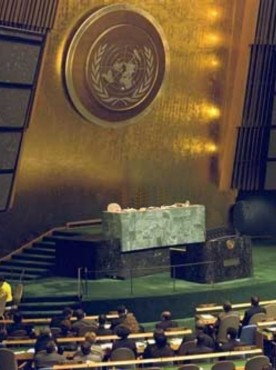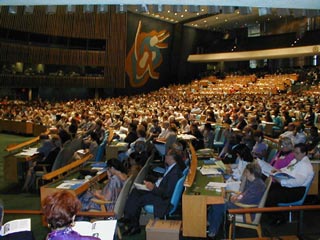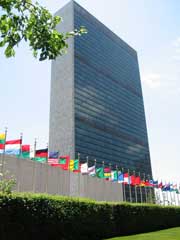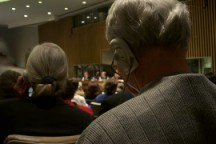|
no. 5 october - december 2002 |
||||||||||||||||||
Each year a few thousand representatives from Non Governmental Organizations (NGO) associated to the Department of Public Information of the United Nations gather at the organization's headquarters on the shore of the East River outside New York City in the United States of America. They gather to listen, to share, learn, and to network. From September 9-11, 2002, six Carmelites participated in this gathering, officially for the first time, as representatives of the Carmelite NGO. They were joined by over 2,700 representatives of 650 NGOs headquartered in 80 countries. Attending on behalf of the Carmelites were Ursula Diasselliss, President of the Congregation of Our Lady of Mount Carmel, Carlos Mesters, General Councilor for Peace and Justice, Helen Ojaro, member of the Congregation's NGO Committee representing the Philippine region, Miceal O'Neill of the International Carmelite Commission for Peace and Justice, Jane Remson, Chair of the Congregation's NGO Committee and main representative to the United Nations and William J. Harry, General Councilor for Communications. The official theme of the conference was "Rebuilding Societies Emerging from Conflict: A Shared Responsibility." The conference explored the role of the international community in supporting societies emerging from conflict. It examined the common experiences of NGO efforts and attempted to highlight the best practices that people have developed to live together peacefully. Speakers included Mary Robinson, the out-going United Nations High Commissioner for Human Rights, Lakhdar Brahimi, the Special Representative of the Secretary General for Afghanistan, and Jos‚ Luis Guterres, the Vice Minister for Foreign Affairs and Cooperation for East Timor. The final speaker of the conference was Vojislav Kostunica, the President of the Federal Republic of Yugoslavia. In one of her final public appearances as UN High Commissioner for Human Rights, Mary Robinson stressed the need for forgiveness and reconciliation to be present if any lasting resolution to the conflict is to occur. Thanking the NGO representatives for their information and analysis, Ms. Robinson acknowledged the role of NGOs in her own work in human rights. "Our efforts cannot succeed without a strong NGO presence," she said. Besides the large gatherings twice a day, NGOs could
participate in a variety of conferences on a variety of topics such as
disarmament and the rebuilding that is necessary in education, finances,
and the life sustaining elements needed by the people recovering from war.
A number of these workshops were on specifically religious topics and
echoed Mary Robinson’s call for the inclusion of forgiveness and
reconciliation to be foundational elements of the rebuilding process.
Titles included "The NGO Role and Experience in Promoting Reconciliation
and Peace-Building," "Weaving Threads of Reconciliation," "The Role of
Faith in Recovering From Conflict," and "Psychosocial and Structural
Elements of Conflict Resolution: Forgiveness and Healing."
However, the Carmelites also worked to attain NGO status so that we could also bring a specifically Carmelite perspective to issues being dealt with at the UN. One step in this will be the posting of Carmelite peace and justice initiatives on the NGO website. Efforts will be made to also post reflections on the common points between our efforts and UN efforts as well as what we as Carmelites feel is where the UN needs to go in order to solve these issues. The process of applying for consultative status with the Economic and Social Council (ECOSOC) is being investigated. Obtaining ECOSOC status would give us the ability to speak out on issues and participate, in a limited way, in policy development. The application process for ECOSOC takes a couple of years. A mailing is being sent to all monasteries, priories, Superior Generals of the affiliated congregations and institutes, and some Lay Carmelites. It gives more information about the goals of the Carmelite NGO and invites individuals and ministries to highlight their work in the area of peace and justice. There are a lot of efforts by individual Carmelites, communities, Carmelite institutions, Provinces, and monasteries of which we know little. Our hope is that through articles in the various publications and on
the NGO website, we will also begin to share ideas and resources among
ourselves. This will be critical to any effective development of the
Carmelite NGO. For more information about the Carmelite NGO, some of the Carmelite initiatives in the area of Peace and Justice, the UN NGO Conference, and the resources now available to us because of our association with the Department of Public Information of the United Nations, go to: carmelites.info/ngo TWO VIEWS ON UN CONFERENCES UN Conference Includes Business Sector to Avoid Past Mistakes According to articles published following the UN mega conference in Johannesburg, Secretary-General Kofi Annan praised the achievements of the summit. "Governments have agreed here," Annan said Sept. 4 on the summit’s Web site, "on an impressive range of concrete commitments and action that will make a real difference for people in all regions of the world." The world summit was designed to fulfill a twofold purpose. First, it was a 10-year review of the implementation of commitments adopted by the 1992 U.N. Conference on Environment and Development, held in Rio de Janeiro, Brazil. Second, it was an occasion to adopt new goals and measures for renewing global commitment to sustainable development. Among the measures adopted by the summit were environmental standards for managing the forces of globalization, and recognition of the need to encourage corporate responsibility, the London Telegraph noted Sept. 4. Goals include halving by the year 2015 the proportion of people without access to basic sanitation, and a pledge to raise the global share of renewable energy sources. Delegates also undertook to reduce the destruction of forests and the killing of rare animals by 2010. They also agreed on the need to restore fish stocks, strengthen measures against marine pollution, cut illegal fishing and create a global network of protected aquatic areas by 2010. On economic matters the final document calls for an increase in aid to developing countries and the establishment of a World Solidarity Fund to help poor nations. There was also agreement that Africa deserves special attention and more aid. Many hailed the forming of partnerships between multinational companies, governments and private organizations to fight diseases, bring clean water to African communities and foster better environmental practices, the Financial Times noted on Sept. 4. The Economist, in its Sept. 7 issue, noted that while business was barely present in Rio a decade ago, some 700 companies and 50 chief executives attended the Johannesburg talks. This newfound cooperation led to 230 initiatives between governments, companies and nongovernmental groups. "These public-private partnerships may have more impact than all the fine words spewed at the Rio talks," the magazine concluded.
While there will be some positive results, the Johannesburg summit was viewed with skepticism by others. According to published reports, while some saw the involvement of business in the conference as a step in the right direction, others were aghast at the idea of cooperating with the private sector. Other criticisms came from green pressure groups, "who were furious at
the attitude of governments led by the U.S., notably on the environment,"
the Financial Times noted on September 4. In an article on September 3, The London Times questioned the purpose of dedicating no less than 11 hours just to hear the more than 70 world leaders make speeches. "A little less conversation, a little more action," urged Business Action for Sustainable Development, according to Reuters on Sept. 4. Similarly, Reuters quoted Danish Prime Minister Anders Fogh Rasmussen telling a news conference: "I don’t think more mega-summits are the way to secure effective implementation." The concentration on sustainability, the focus of the gathering, also came in for criticism. "Energy and other natural resources have become more abundant, not less so," Bjorn Lomborg wrote in the New York Times. "More food is now produced per capita than at any time in the world’s history. Fewer people are starving." A paper presented by the Vatican delegation to a conference held in Indonesia as preparation for the Johannesburg summit pointed out: "This concept (of sustainable development) has to be understood from the perspective of integral human development." It would be a mistake if the development spoken of were to be restricted to economic growth alone, explained the Vatican submission: "To be authentic, it must be well rounded; it must foster the development of each human being and of the whole human being." Many admit that the Johannesburg summit avoided some of the excesses of past U.N. conferences. However mixing major themes brought difficulties. "Tackling just one of these themes, let alone both of them, would have been a tough task," said sources.
How beautiful, on the mountaintops, are the feet of
those who bring your word. In reflecting on my experience at the United Nations in New York City,
the words from Joe Wise’s song kept coming to mind. Both ways of being
with others are good. Some of us will be on the mountaintop; others will
be on the city streets; and still others will be moving between the two
because our Carmelite spirituality embraces the totality of reality. Because we are at a time of transition to a global community and our ministries of direct service necessarily have a local focus, our connection to the UN can help to broaden our understanding about the reality of life in other areas of the world. We must take the time to ponder the similarities and differences and let them dwell in our hearts. The theologians among us are called to share their reflections relating the message of Jesus in the Gospels to the present global reality. We, as Carmelites, like other religious groups, are called to take the lead in the creation of a new world order because national governments are not designed to meet global needs. In order to do this, affiliation with the UN is essential, but at a different level. At the present time the Carmelite NGO is associated with the UN Department of Public Information, which allows us to receive information from them and disseminate it through our ministries. We will apply for consultative status with the Economic and Social Council which would give us the ability to speak out on issues and participate in at least a limited way in policy development. It is at this level that we can be involved in decision making which will help design our future global society. Leadership is called to be future oriented; it is from this stance that I urge all Carmelites to become involved in bringing about the reign of God in our world. These are not pious words; they are as real a call from God as were the ones to Moses, Abraham, Isaiah, Mary, Peter and John, Teresa and John of the Cross, Therese, Edith and Titus. We are one human family, from Adam and Eve to future generations we can only imagine. The life of God in us, grace, impels us to root our ministries not just in our Carmelite spirituality, but in a new sense of global interdependence and shared responsibility for bringing forth a sustainable global community. Let us pray for and support each other as we each discern where God is calling us at this time.
|
||||||||||||||||||
|
RETURN TO THE INDEX FOR 2002 | RETURN TO THE INDEX FOR THIS ISSUE RETURN TO THE CARMELITE NGO WEBSITE INDEX OF CARMELITE
WEBSITES |
||||||||||||||||||



